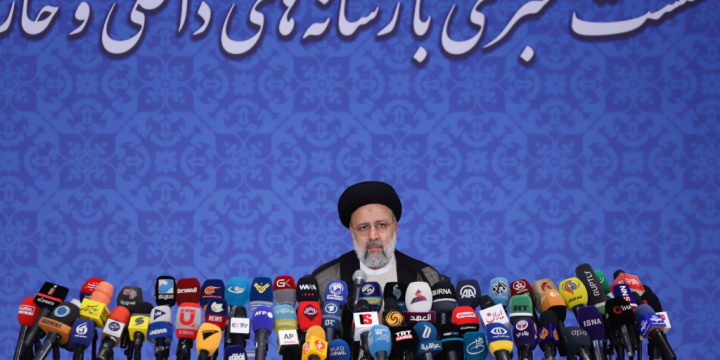
Iran’s President-elect Ebrahim Raisi attends a news conference in Tehran, Iran June 21, 2021. Majid Asgaripour/WANA (West Asia News Agency) via REUTERS
As European and US diplomats voice their frustration with Iran’s new demands amid last-ditch efforts to revive the 2015 nuclear deal, experts say Tehran is demonstrating little interest in moderating its stance, undeterred by the threat of harsher economic sanctions should diplomacy fail.
Indirect nuclear talks between Iran and the world powers, which entered their seventh round on Nov. 29 in Vienna, are verging on collapse as Tehran under recently-elected president Ebrahim Raisi has abandoned compromises achieved in previous sessions.
Sima Shine, head of the Iran program at the Institute for National Security Studies (INSS) in Tel Aviv, argues that the demands Iran is now putting on the table will be “impossible” to get.
“Iran is not motivated too much to go back to the JCPOA. They have no interest and they believe they can survive,” Shine told The Algemeiner. “They are not in a hurry to any place and in the negotiations, they feel they have the better cards.”
Related coverage
December 16, 2021 5:50 pm
In 2018, the Trump administration withdrew from the original nuclear deal, known as Joint Comprehensive Plan of Action (JCPOA), which saw Iran limit its enrichment of uranium in exchange for the lifting of economic sanctions.
Britain, France and Germany said Tuesday that the parties were “rapidly reaching the end of the road” to restore the 2015 nuclear accord, citing Iran’s “continued nuclear escalation.” Tehran demands the immediate removal of all sanctions before any action is taken on the nuclear side and seeks guarantees that “no US administration” will renege on the pact again.
“There will not be a make-or-break point in the talks soon because it doesn’t serve any side to make a break. The Americans want to make, but not to break,” Shine said. “I don’t think Iran wants to go back to the original deal. Iran wants to reach the point of a nuclear threshold country and probably also one day of a proclaimed nuclear country.”
Danny (Dennis) Citrinowicz, former head of the Iran branch in the research and analysis division of the IDF’s Military Intelligence unit, believes that the Iranian leadership thinks it can withstand the pressure, holding alternatives should economic sanctions not be lifted.
“Iran sees the support of Russia and China for their position,” Citrinowicz told The Algemeiner. “If there won’t be a JCPOA, Iran couldn’t care less as they will continue to move forward with uranium enrichment, and work with China to defuse any sort of sanctions being imposed, by continuing to export oil to China — which could open the doors in the east and maybe Africa.”
Iran also assumes that the US doesn’t have any alternative other than returning to the deal, Citrinowicz added.
Citing the Trump administration’s 2018 pullout from the deal and the reimposition of US sanctions, the Islamic Republic has begun enriching uranium up to 60 percent purity, a technical step from weapons-grade levels of 90 percent. The regime also develops advanced centrifuges barred by the deal as well.
“The US has to gain back its deterrence, and to see that Iran doesn’t believe that they can do whatever they want, and nothing will happen to them,” the INSS’ Shine argued.
Another signal of Tehran’s posture is the fact that Raisi earlier this week submitted his proposed 2022-23 budget with economic growth projections that assume no sanctions relief, she pointed out.
The Iranian government “seems to believe the economy will grow significantly even without sanctions relief or increased oil revenue,” Patrick Clawson, research director at the Washington Institute for Near East Policy, wrote in an analysis this week. “The implications for US policymakers are clear: the Raisi government sees no economic urgency to making substantial nuclear concessions, nor does it fear the punitive economic measures that the Biden administration has threatened to apply in the absence of a deal.”
Still, with no clear alternative to diplomacy, negotiations are likely to continue, experts say.
Citrinowicz suggested several options that could change the Iranian calculus — a fresh backchannel, China moving toward the US position, or the Biden administration partially lifting sanctions as a gesture — but deemed all of these unlikely.
Shine sees a 50-50 chance that following several months of further talks, Iran might settle for a limited, “less for less” agreement, in exchange for the removal of sanctions on oil exports, while leaving in place their nuclear achievements of the past year.
“That is a very small price for the Iranians to pay,” she said. “It would be a very bad decision because it will give the Iranians the relief they need and they will not pay any price in terms of rolling back the nuclear achievements of last year to 60 percent enrichment.”
“The Americans would be able to live with that. It’s not ideal, but it stops the advancement of the nuclear program and they will present it as a step on the road of going back to the JCPOA which will never happen,” Shine added.
Meanwhile, Israel, which fiercely opposes the 2015 nuclear accord, has stepped up the pressure in recent weeks over concern that the US will settle for a bargain deal.
White House National Security Adviser Jake Sullivan is expected to travel to the Jewish state next week for discussions on Iran. Israel has long argued argued that Tehran is simply seeking to buy time to move forward with its nuclear program, and that military options must remain on the table to prevent Iran from developing nuclear weapons.
US Secretary of State Antony Blinken said Tuesday that the US was still pursuing diplomacy as the “best option” for the moment, but that it was “actively engaging with allies and partners on alternatives.”
The Link LonkDecember 17, 2021 at 04:51AM
https://www.algemeiner.com/2021/12/16/with-vienna-talks-on-cusp-of-collapse-little-reason-seen-for-iran-to-rejoin-nuclear-deal/
With Vienna Talks on Cusp of Collapse, Tehran Sees Little Reason to Restore Nuclear Deal - Algemeiner
https://news.google.com/search?q=little&hl=en-US&gl=US&ceid=US:en

No comments:
Post a Comment